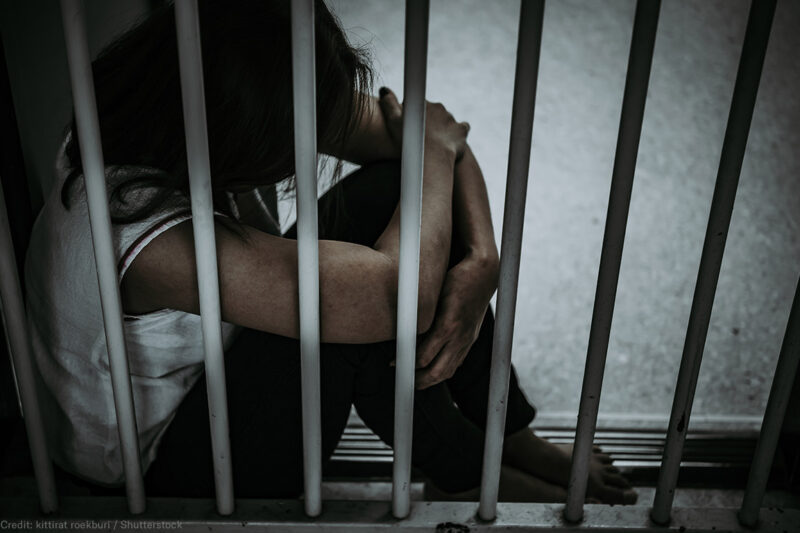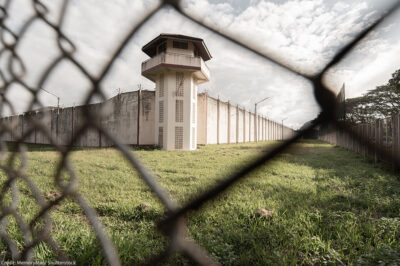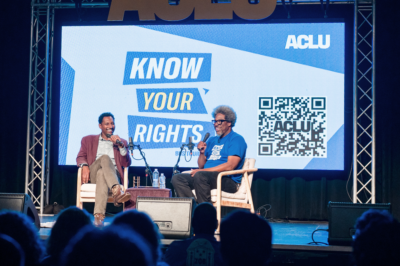
Tanisha (a pseudonym) is a 25-year-old mother of four who was arrested in Oklahoma in 2017 following a domestic dispute with her boyfriend. Three of her children, a toddler and twin infants, were present. Once jailed, Tanisha’s bail was set at $61,000. She couldn’t afford to pay it, so she stayed behind bars, separated from her children.
This is wealth-based family separation perpetuated by the criminal justice system.
A new joint report from the ACLU and Human Rights Watch, “You Miss So Much When You’re Gone,” shines a light on this injustice and shows how even short stays in jail can have a lasting impact on families. The report focuses on Tanisha and other moms who have been jailed in Oklahoma, a state that incarcerates more women per capita than any other.
After a month in jail, Tanisha was desperate to get back to her kids, so she decided to accept a five-year suspended sentence. But shortly after she was released, her children were taken into foster care. Tanisha has been struggling ever since to regain child custody.
The state has placed a host of obstacles between Tanisha and her children, such as paying for programs and services the state requires but she doesn’t have the money for. She can’t afford required domestic violence classes. She can’t afford a parenting class. She can’t afford a psychological evaluation. She lost a job because she was trying to attend child welfare meetings and receive required services. As a consequence, she fears that her children will be adopted and that she will lose them forever.
Tanisha is far from alone.
Our research found that having children at home makes the pressure to plead guilty especially acute. Some moms we spoke with accepted a guilty plea offer just to get out of jail so that they could take care of their children. They also fear that their children will end up in foster care, which might result in their loss of parental rights.
According to federal and local reunification timelines, parental rights can be terminated if a child remains in foster care for longer than 15 months. This timeframe is even shorter when children are under 4 years old. While moms are in jail, they face difficulties getting in touch with child welfare caseworkers, receiving notice of custody-related proceedings, and getting transported to those hearings.
They also may end up not seeing or speaking with their children at all.
Most jails in Oklahoma do not allow in-person visitation, and some have gone so far as to bar children from visiting. The isolation and separation do not end there. If moms don’t have money on their jail account, they often can’t place video or phone calls to keep in contact with their children. And if their children are in foster care, setting up visits is even more difficult.
Once released from jail, moms are met with extensive fines, fees, and costs that can hinder getting back on their feet and regaining or maintaining custody of their children. They may leave with a bill for each day they stayed in jail or a bill for seeing a doctor. They may end up paying $40 per month to be supervised on probation. They may also have to pay for parenting classes or psychological evaluations as part of a parent-child reunification plan.
Approximately 1.5 million women are admitted into local jails each year. Nearly 80 percent are mothers with minor children. Most are accused of minor crimes. Many remain in jail for weeks, months, a year, or more, waiting for the disposition of their cases — often because they cannot afford to pay money bail. Like Tanisha, pretrial detention can snowball into never-ending family separation as people attempt to navigate court systems and overcome what are truly insurmountable financial burdens assessed by courts, jails, and child welfare services.
We urge Oklahoma and other states to work intentionally to address the over-incarceration of women and the separation of mothers from their children. Oklahoma, and all states, should be required to consider a person’s primary caretaker status in bail and sentencing proceedings. They should be required to expand alternatives to arrest and incarceration. They should programmatically facilitate the involvement of incarcerated parents in their children’s lives and proceedings related to child custody and substantially curb the imposition of fees and costs, which too often place barriers at reentry and to parent-child reunification.
No one should lose contact with their children or risk losing their parenting rights because they can’t afford bail, especially in a country where the presumption of innocence is a bedrock foundation of our criminal justice system.
Every day across the nation, the ACLU is called on to defend all the freedoms guaranteed in the Constitution and the Bill of Rights. There's never been a more important time for to support the ACLU and our effective work to protect civil liberties. If you like what just you read, help us continue to speak freely by donating today.




